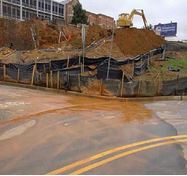What are some things we can do to reduce polluted runoff?
Lorem ipsum dolor sit amet, consectetur adipiscing elit, sed do eiusmod tempor incididunt ut labore et dolore magna aliqua.
Lorem ipsum dolor sit amet, consectetur adipiscing elit, sed do eiusmod tempor incididunt ut labore et dolore magna aliqua.
Individually
- Do not blow leaves and grass into storm drains or ditches - Dumping leaves and grass clippings into the stormwater management system impacts streams. The increase in nutrients associated with grass clippings can cause algae growth, which can kill fish and other aquatic life.
- Never pour anything other than stormwater down a storm drain - Pouring chemicals down a storm drain has the same impact as dumping the chemicals directly into a stream. Never wash a chemical such as paint or cleaner fluids into a storm drain.
- Keep your pets away from waterside areas and when walking pets, clean up after them - Animal waste contains bacteria, which is harmful to streams. Pick up all pet waste and dispose of it properly by wrapping it and placing it in the trash or flushing it down the toilet. Never dispose of pet waste in a storm drain.
- Properly maintain septic systems – Improperly maintained septic systems make leak waste, which contains bacteria and harmful chemicals, into streams.
- Follow Manufacturer’s specifications when using fertilizer, pesticides, and herbicides - Applying fertilizer, pesticides, and herbicides in excess leads to stormwater pollution. The excess chemicals wash off the lawns with the next rain, and flow into the nearest storm drain and directly to the nearest stream. Once they reach the stream, these chemicals will degrade water quality and are very harmful to aquatic and wildlife.
- Report any unauthorized dumping or pollution – You can help reduce the pollution in our streams by being a good stormwater steward. You can now report problems online.

Business Owners
-
Recycle oil and grease; do not pour oil and grease into sinks, drains or onto streets and parking areas – Oils and grease contain heavy metals which are hazardous to stream vegetation and animal life. Oils poured onto pavement or other hardened surfaces will wash off and into streams with the next rainfall.
-
Properly dispose of contaminated water and chemicals – if materials are improperly stored, or kept in open areas, they can mix with stormwater during the next rain.
-
Keep toxic materials contained and stored properly
-
Keep the lids of dumpsters closed and make sure they are clean and not leaking
Developers
-
Recycle oil and grease; do not pour oil and grease into sinks, drains or onto streets and parking areas – Oils and grease contain heavy metals which are hazardous to stream vegetation and animal life. Oils poured onto pavement or other hardened surfaces will wash off and into streams with the next rainfall.
-
Properly dispose of contaminated water and chemicals – if materials are improperly stored, or kept in open areas, they can mix with stormwater during the next rain.
-
Keep toxic materials contained and stored properly
-
Keep the lids of dumpsters closed and make sure they are clean and not leaking
(Use this link to view common questions and answers about Stormwater Management.)


